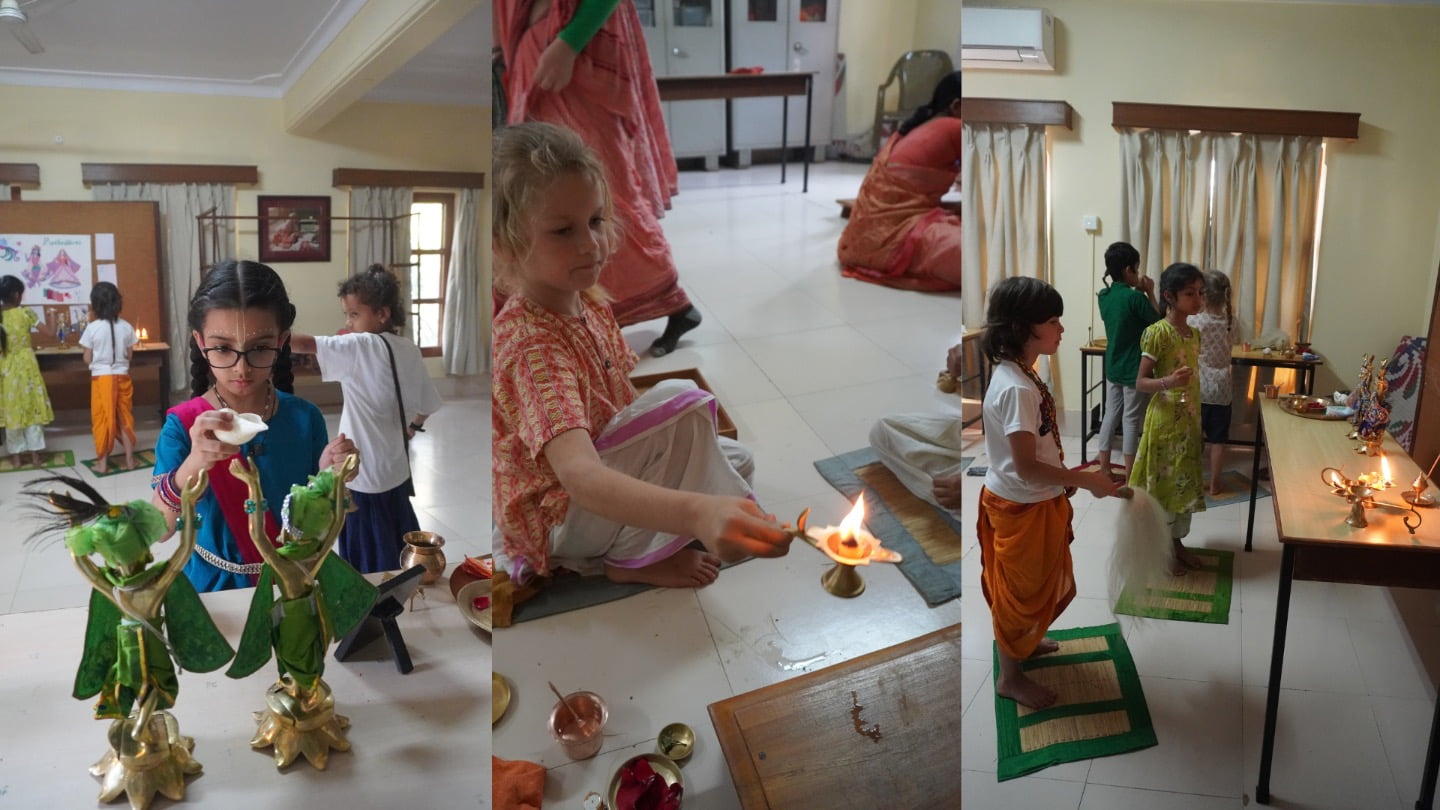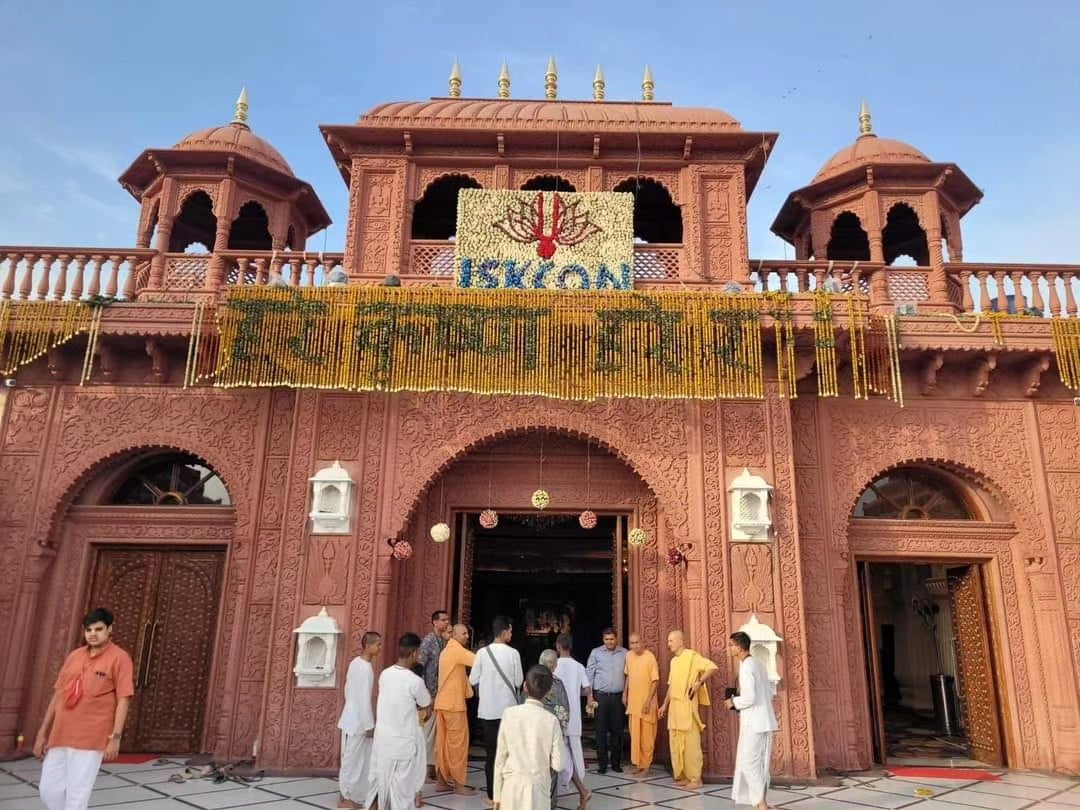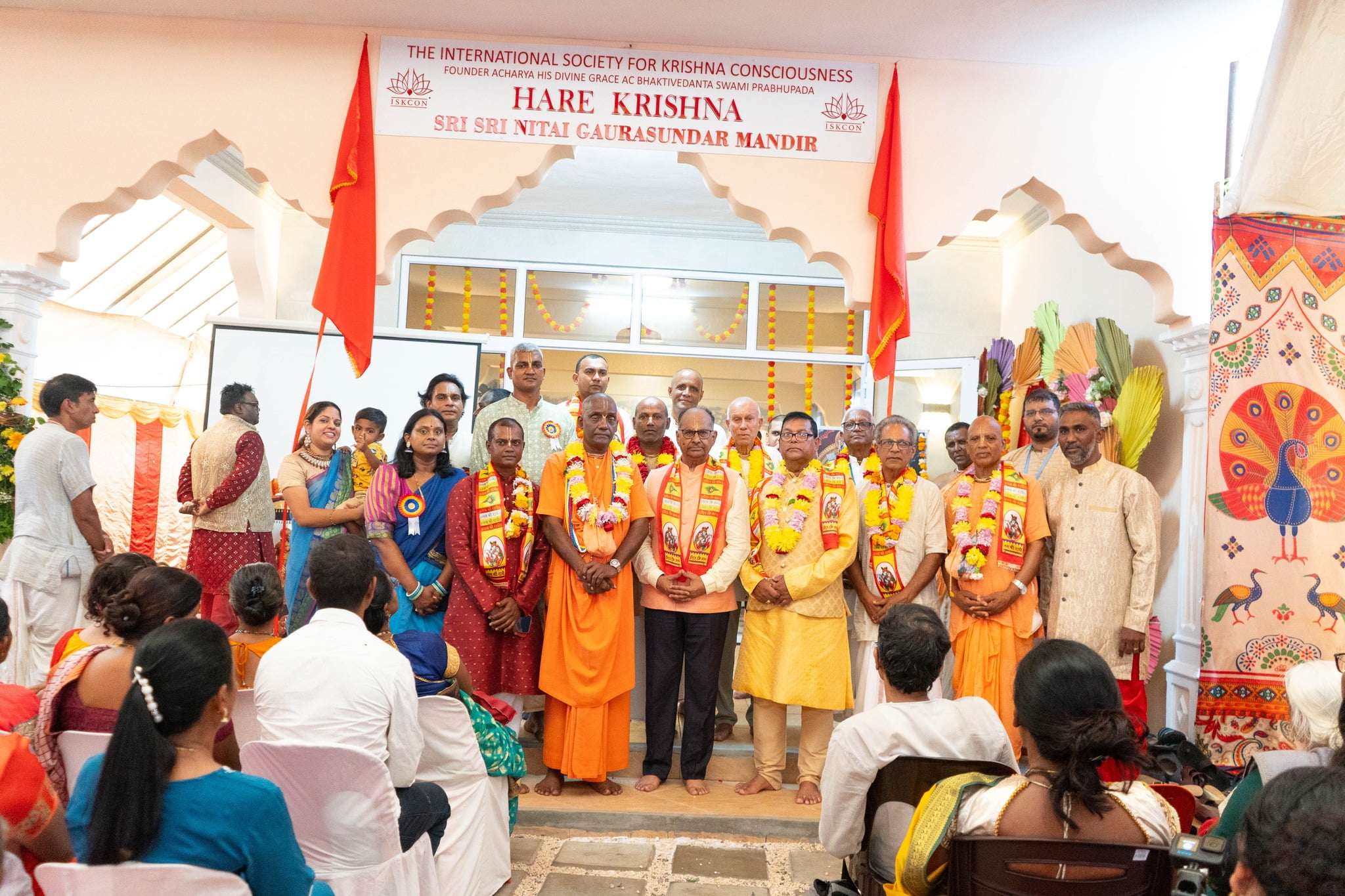New Vrindaban Residents Grow Gardens For Food Security Amid COVID-19
By Madhava Smullen | May 19, 2020
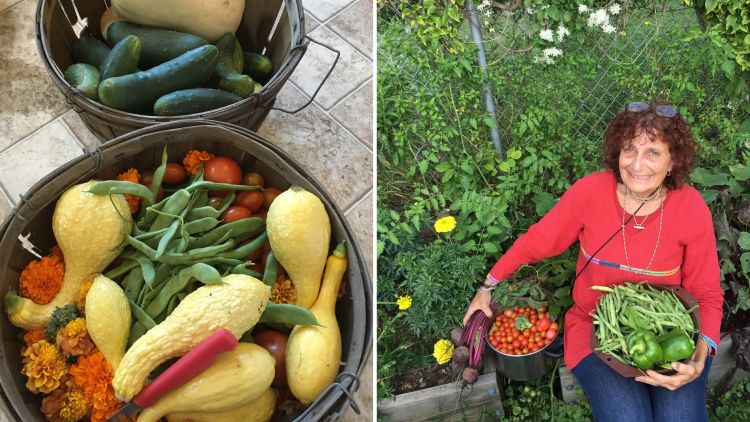
According to NPR, fear of food shortages during the COVID-19 pandemic has spurred people on to plant more vegetable gardens; while community supported agriculture programs (CSAs) are booming.
In New Vrindaban, West Virginia, ISKCON’s first rural community which Srila Prabhupada earmarked as an example of sustainability to the world, resident devotees have a headstart, and are using the pandemic to push themselves closer to their goal of self-sufficiency.
A few weeks ago, responding to an impetus by the GBC and the ISKCON Ministry for Cow Protection and Agriculture, members of the ISKCON New Vrindaban and Eco-Vrindaban boards and New Vrindaban Village Council formed a small working group to explore New Vrindaban’s food security needs, and see what they could do to enhance food security in the short term.
Allegra Lovejoy Wiprud, a board advisor for ECO-V, graduate student at Yale Forest School and founding member of the Sacred Ecology Forum, says, “Many rural areas do suffer from food insecurity as practices of farming, food storage, and local-food diets have been supplanted over time by consumption patterns dependent on the mass supply chain. This food insecurity is often paired with economic insecurity, leading to a rural hunger crisis in many parts of America, which is exacerbated at times like this.”
Of course, New Vrindaban is fortunate to have had a focus on farming and rural food security for many years. To begin with, the ECO-V farms and staff, headed by General Manager Ranaka Das, supply a great deal of produce to the temple and community.
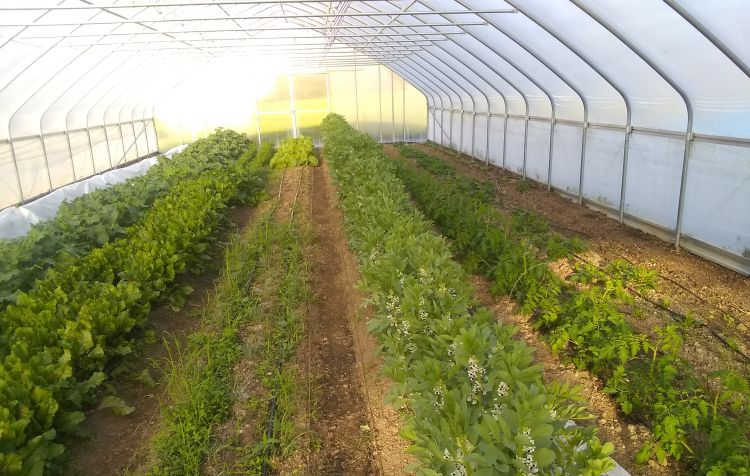
Vegetables growing in the ECO-V high tunnel
Three high tunnels, installed last summer, enable staff to grow vegetables and flowers all year round. Two of them measure 30 x 96 feet while the other, on longtime resident Vidya Dasi’s land, is 30 x 60; all are temperature controlled with a thermostat and fitted with bug netting, an irrigation system, and a liquid injector fertilizer system.
Although outside temperatures in New Vrindaban are still cold, kale, lettuce, spinach, turnips and radishes have already been growing in the high tunnels. One hundred and twenty tomato plants will be ready to harvest in about four weeks; along with beets, carrots, green beans, and fava beans. Excess veggies will be canned or frozen.
“We’re also about to plant 1,200 pounds of white potatoes, and I’ve ordered 150 sweet potato plants,” says Analaksita Dasi, who oversees the high tunnels.
With the temple requiring much less produce due to the pandemic lockdown, the ECO-V gardens will be setting up a weekend farmer’s market starting at the end of May where New Vrindaban village residents can pick up vegetables – with all appropriate COVID-19 precautions in place.
“And of course, our produce doesn’t get handled as much as what you get from the grocery store,” Analaksita says. “Here, it goes straight from the ground to your hands.”
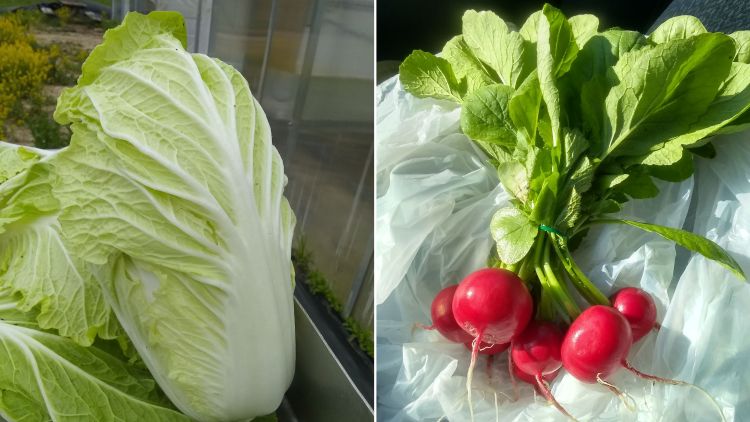
Lettuce and raddishes from the ECO-V high tunnels
ECO-V staff are also delivering care packages to elderly devotees in the community so that they don’t need to visit grocery stores as often, as well as plants to devotees who want to start their own gardens.
Meanwhile, many individual residents of New Vrindaban are also skilled gardeners who practice food storage too. Many are already growing cold weather or perennial crops like broccoli, peas, asparagus, rhubarb, beets, carrots, raddish, spinach, coriander and beets, and set to harvest some of them soon. Other vegetables, like tomatoes, cucumbers, yellow squash, zucchini, peppers and okra will be planted in late May, and harvested at different times beginning in June or July. Several devotees already have high tunnels on their own properties, while others are applying for grants for tunnels in the future.
Gopisa Das, who oversees the restoration of Prabhupada’s Palace and has maintained a garden in New Vrindaban for the past thirty years, has a 60 x 100 foot garden on his property and produces enough vegetables and flowers to regularly supply Sri Sri Radha Vrindabanchandra as well as himself and his wife.
“Some years we’ve been too busy and haven’t planted much at all,” he says. “But this year we’re absolutely going to max out. We’re also going to do some food preservation, freezing, canning, and drying crops like herbs, tomatoes, green beans, and cucumbers. Canning keeps vegetables good for a couple of years, freezing for one year if they’re vacuum sealed. I think the silver lining of this pandemic is that it’s helping us to get motivated and reconnect to the land more.”
Some devotees are growing different kinds of crops, adding variety. Sukhavaha Dasi, who previously led the devotee care department at ISKCON New Vrindaban and is now coaching online, has thirty blueberry bushes and thirty fruit and nut trees including apple, plum, nectarine, pear, cherry and walnut. The blueberries will be ready to pick in June, and the others in the fall.
“I also have spearmint – I’m making spearmint tea right now,” she says. “And I regularly crack open some black walnuts from the four boxes I harvested last fall – they stay good for years in their shells.”
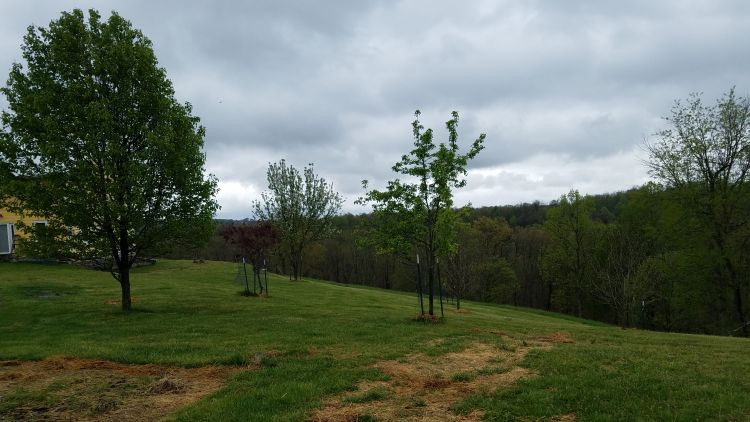
Fruit trees on Sukhavaha’s property
Meanwhile Rupanuga Das and his wife Vani Dasi, who are originally from Gujarat, are growing Indian vegetables such as Lauki (bottle gourd), Karela (bitter melon), and Turia (ridge gourd).
“We also grow arbi (colacasia) leaves to make a dish called patra, where the leaves are rolled with a chickpea flour paste and spices, and steamed or fried,” Vani says.
Vani also gives excess vegetables to the temple, and freezes some for the following year. “With frozen tomatoes, I’ve made tomato sauce, salsa, and ketchup,” she says.
Perhaps one of the devotees most enthusiastic about gardening is Gopalasyapriya Dasi, who has lived in New Vrindaban for about forty-five years, the last twenty of which she’s spent taking care of the famous Prabhupada’s Palace rose garden.
Gopalasyapriya also grows vegetables on nine raised beds at home, and has always found it gives her solace and upliftment.
“Back when I was just out of high school, I started working in a greenhouse, and it changed my life,” she says. “That’s when I lost interest in intoxication and such activities. I felt like I got a higher taste from gardening. Which is why, when I became a devotee, I wanted to come live in New Vrindaban. It always makes me feel better to go outside, work with the soil, and watch things grow. I love seeing all the different types of roots and leaves – it always makes me think of how amazing Krishna is to have created so many varieties. It’s so enlivening for me.”
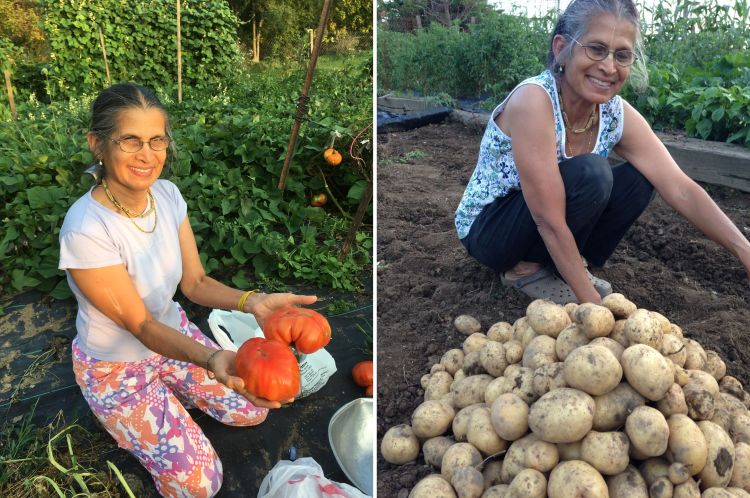
(left) Vani Dasi uses tomatoes from her garden to make salsa and ketchup (right) Vani with a new crop of potatoes
Even devotees who don’t have their own land and gardens are helping to address the food security issue by sharing expenses and labor with those who do. These include GBC zonal supervisor Jaya Krsna Das and his wife communications director Anuradha Dasi, who are participating in a work share with Gopalasyapriya on her garden – while social distancing, of course.
The amount of local devotees taking up gardening is only set to grow – The ISKCON New Vrindaban and ECO-Vrindaban boards recently released a survey to the community to find out what households are currently doing in terms of gardening and food storage, and what support they could use to expand on it.
“We want to take an asset-focused view: not focusing on what might be lacking, but celebrating the assets of knowledge, infrastructure, land, and the activities that are already going on,” says Allegra Lovejoy Wiprud. “More than half of respondents said they are already gardening, and the remainder said they are interested in taking it up. I’ve also seen residents ‘reclaiming’ land that has been somewhat neglected, like New Vrindaban’s orchards and some pastures. It’s possible that the pandemic and economic crisis is part of this strong interest.”
Of course, like most rural communities, New Vrindaban does also rely on the mass supply chain. Aside from vegetable and hay production, gardens, and dairy, which NV already has to some extent, one way this can be addressed is grain and legume storage.
“New Vrindaban has practiced bulk grain and legume storage in the past and is now exploring re-establishing that project to provide the temple and households with a secure supply of these staples,” Allegra says.
Gopisa Das, who started the grain and legume storage project, adds that the community also has the ability to make its own flour.
In such uncertain times, these kinds of efforts bring with them a sense of security.
“Other investments can get smashed by a pandemic,” Sukhavaha Dasi comments. “Investments in sustainable living, in Mother Earth, however, don’t go away.”



